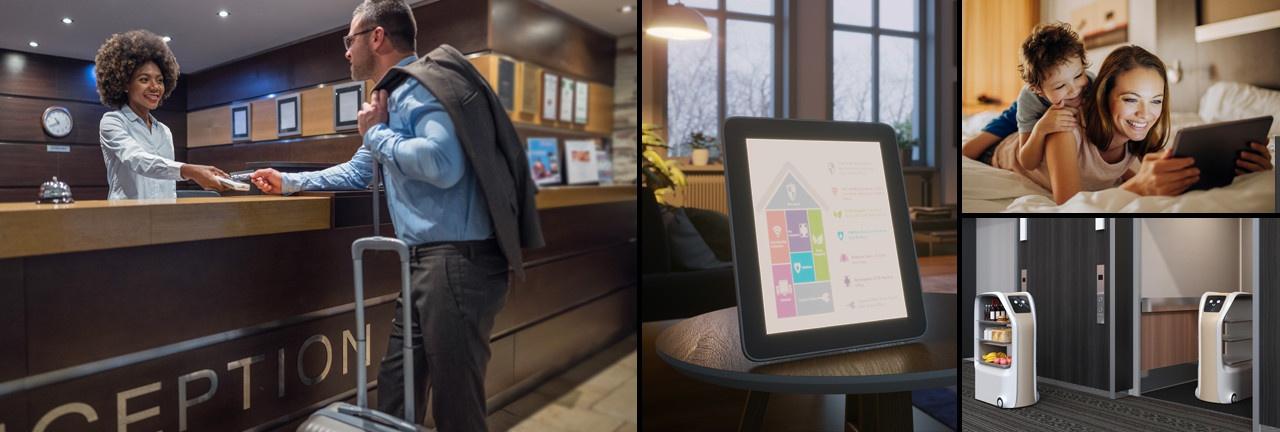A new model for technology partnerships in the Hospitality & Leisure sector
This, in turn, has transformed many H&L organisations' relationships with their technology providers. Traditionally, organisations across the sector have maintained highly decentralised networks of technology partners, with separate providers handling different aspects of their overall IT infrastructure. For example, one partner for guests' connectivity, one partner for corporate connectivity, one for LAN and Wi-Fi… While such partner networks have met the sector's requirements for many years now, the challenges of the COVID era have revealed a number of weaknesses inherent in these arrangements.
The biggest challenge is communication and collaboration. Working with multiple suppliers for different areas of the IT infrastructure will inevitably require suppliers to regularly engage with each other in order to ensure all solutions are properly integrated, which can easily lead to blockages during any complex deployment and - in turn - limit the resulting flexibility, scalability, and overall visibility of any new solution.
Throughout 2020 and 2021, when numerous organisations were forced to rapidly pivot in response to COVID restrictions and - in many cases - dramatically overhaul their technology infrastructure, it became clear that this was not acceptable. As we enter the nascent post-pandemic era, it is clear that flexibility will be a critical priority for all IT infrastructure, in order to ensure any future COVID-scale shifts in the landscape do not affect the guest experience any more than is absolutely necessary.
Why leaders in Hospitality & Leisure are embracing the single-partner model
Over the past two years, I've worked closely with a number of top hotels in order to answer this very question. In every case, the answer has been to consolidate yesterday's disparate technology partner networks into streamlined, highly agile partnerships with providers who can offer the full range of technology solutions in bespoke, fully integrated combinations, delivered as managed services that free internal teams to centre the guest experience by complementing their own technical expertise with that of dedicated specialists. This is will provide the foundation of tomorrow's smart hotels and the intelligent use of automation and data analytics to optimise every guest's experience, before, during, and after their stay.
So, what would such partnerships look like in practice?
In a sector as diverse and dynamic as H&L, there's no such thing as a one-size-fits-all solution. As such, no two partnerships will ever be the same (that is, if the technology provider has done their homework and really taken the time to explore their customer's goals and requirements!). Nonetheless, based on the digital transformation projects I've been involved with and the conversations I continue to have with leaders across the sector, there are a few elements I would argue will prove essential in the years ahead:
A holistic, real-time view of the entire infrastructure
As we touched on above, one of the traditional technology challenges within the H&L sector has been the lack of a high-level, holistic view of IT infrastructure, caused by disconnected systems and suppliers. Consolidating all solutions under a single partnership will allow for the implementation of a bespoke dashboard that not only allows for a real-time view of performance at the macro and micro levels, but informs effective, data-driven decision making at all levels.
Leading-edge cyber security inherent in the design
In light of recent geopolitical events, the cyber threat landscape is more complex than ever before, especially for sectors like H&L, where high volumes of customer data are generated, transferred, and stored on a daily basis. With ransomware attacks increasing in scale and sophistication, cyber security ecosystems must draw on the very latest threat intelligence and take a proactive approach to monitoring, ensuring updates are automatically applied and potential vulnerabilities identified and resolved. This should be complemented by robust disaster recovery and business continuity measures, as even the most sophisticated security ecosystem cannot wholly guarantee a ransomware attack will not prove successful.
A vendor-agnostic approach
Infrastructure should be designed around the customer's requirements and those of their guests, not the provider's solution portfolio, so a vendor-agnostic approach is critical, using multiple technologies on an as-needed basis.
With the growing popularity of sophisticated applications that put a range of services at guests' fingertips, the Cloud offers an ideal platform for such solutions, while opening the door to increasingly sophisticated AI, machine learning, and big data projects. The single-partner model can take much of the stress and complication out of Cloud transformation, ensuring public, private, and hybrid solutions can be successfully integrated with the wider IT infrastructure and - as above - monitored and managed through a single pane of glass, for complete control and visibility.
World-class connectivity as the foundation
Connectivity underpins everything and should be designed in such a way that segregates network traffic for staff and guests, while providing the resilience, security, and performance needed to accommodate even the busiest periods, such as holiday seasons or highly anticipated events.
A comprehensive overview of digital transformation for the entire Hospitality & Leisure sector
01. Maintaining the human touch while offering stress-free, contactless stays, from booking to checkout.
02. Accessing new revenue streams through sophisticated data analytics and tailored, omnichannel marketing.
03. Delivering exceptional experiences that turn one-off guests into loyal, repeat customers and help drive brand visibility.
When you subscribe to the blog, we will send you an e-mail when there are new updates on the site so you wouldn't miss them.


